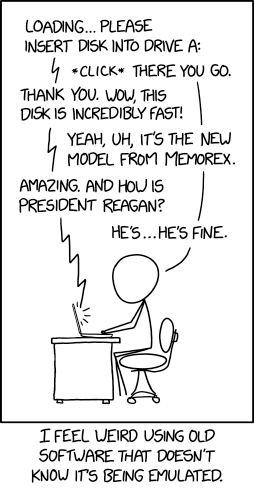Emulation

I laugh at the software as if I'm 100% confident that it's 2019.

I laugh at the software as if I'm 100% confident that it's 2019.
Here Cueball is speaking with a fictitious example of artificially intelligent software similar to the type popularized in the 1980s when personal computers had just become mainstream. Although modern computing platforms might still be backwards-compatible with 8-bit era software, it is more likely that the old applications will need to be run within an emulator that can simulate the necessary hardware components required by the application.
In this case the "8-bit AI" is having a conversation with Cueball as it carries out tasks common to the era, specifically asking the user to insert a floppy disk into drive "A:" (A: traditionally being the first floppy drive on IBM-compatible PCs). At the time internal storage like a hard disk was an expensive luxury item and most applications were stored on removable media. An application that could not fit on a single floppy disk would be programmed to prompt the user to insert successive floppies which held the required data. However, the speed at which data could be loaded from such devices was very slow, requiring anywhere from ten seconds to ten minutes to load a level or an advanced dialog box. Sometimes the software would even incorporate feedback mechanisms like loading screens to let the user know the program was proceeding as intended and had not crashed.
When software operating under an emulator such as DOSBox makes a request to access disc storage, the emulator will often map the command to a file or file system on the enveloping computing environment which can now contain hundreds or thousands of gigabytes of storage. Depending on the configuration, this may require a user action to complete the virtual operation (Cueball's click). The speed of modern hardware allows the data to be transferred at speeds several orders of magnitude higher than what was possible in the past. The 8-bit AI notices this and makes a comment about the transfer speed. Software may indeed have sometimes been designed to track the accessible rate of data, to give a rough estimate of the total loading time (or know how long it may need to animate a "while you are waiting..." display) no matter what the speed of the hardware is. This becomes less important once splash-screens or "spinnng cursors" aren't (usually) expected to stay on screen for many minutes without any obvious signs of practical completion.
Here we begin to see the consequences of emulation upon the anthropomorphized software application. Because the emulator is constructing the application's entire reality, the 8-bit AI has no reason to believe it is anywhere other than a 1980s' computing platform for which it was designed. While the application does notice the abnormally fast load time, Cueball decides to not burst his anthropomorphized program's bubble and responds that the file loaded quickly because of a new floppy disk from Memorex, which was a well-known manufacturer of premium magnetic recording media in the 1980s. Memorex was also known for a famous series of commercials with the tagline, "Is it live? Or is it Memorex?"—tying into the comic's theme of unawareness that something is being digitally duplicated.
To compound the problem, computers of the era often lacked a real-time clock or would have an inability to process dates beyond 1999, and therefore the software application in this comic still believes that it is running at the time of its creation - the 1980s. To this end the program casually asks how President Reagan is doing, as Ronald Reagan was the President of the United States from 1981-1989 when early PCs were on the rise. He died in 2004, 15 years before the publication of the comic. This is why Cueball seems slightly uncomfortable with noncommittally telling the software Reagan is "fine."
In the title text, Cueball references the living in a simulation trope, mentioning that it is not fully clear that he is actually living in 2019. This has been a theme in science fiction such as The Matrix, which has been referenced several times in xkcd. That we are living in a simulation was also the subject of the comic 505: A Bunch of Rocks.